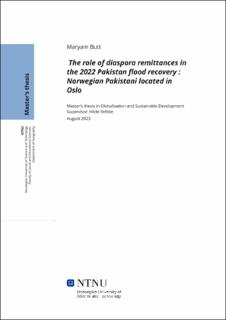| dc.description.abstract | This study addresses the active participation of the Pakistani Norwegian Diaspora in the provision of remittances during the 2022 flood disaster in Pakistan, including both individual and organisational contributions. This study examined the impact of remittances provided by diaspora members on the recipients at an individual level in Pakistan. This study is also intended to investigate the methods by which diaspora organisations helped and supported each other, focusing on their contributions. This research explores the interconnection between remittances and aid, specifically examining the role of diaspora members as contributors. The individual from the diaspora independently sends remittances and contributes to financial fundraising programmes facilitated by diaspora organisations. For a deep analysis, this study utilises qualitative interviews as a means of determining the kind of remittances transmitted and the assistance facilitated by the diaspora organizations. This study examines the frequency, temporal features, and expectations associated with the provision of assistance, considering the viewpoints of both the diaspora donor and the recipient. The present research highlights the significance of appreciating the role played by remittances and the patterns associated with their transfer in the context of disaster response, particularly in relation to the help provided by diaspora organisations. The data indicates that diaspora individual remittances have provided more benefits to impacted people compared to organisational help. Moreover, it has also been revealed that there are certain challenges associated with the implementation of remittances and contributions for diaspora members, whether they donate individually or through organisational platforms. This study also revealed that in periods of crisis, a significant proportion of beneficiaries are people with familial connections, particularly those who get assistance from the diaspora. The findings of this study are aligned with existing knowledge, as they draw upon several theoretical frameworks and authentic data obtained through the analysis of responses pertaining to the influence of diaspora humanitarianism on disaster response regarding the nature of response, nature of types of remittance, and aid being granted, along with challenges. Furthermore, the research offers suggestions that might be used to improve the efficacy of humanitarian assistance in the future, including targeting relief operations facilitated by diaspora networks. | |
